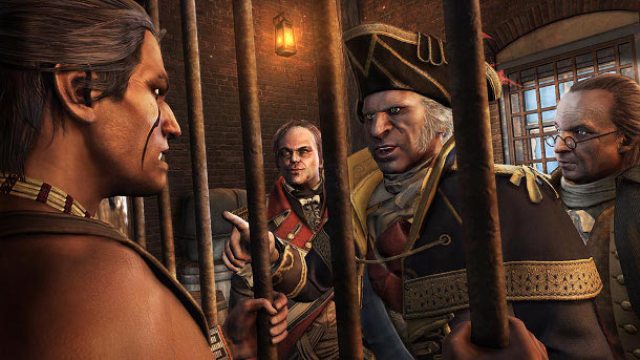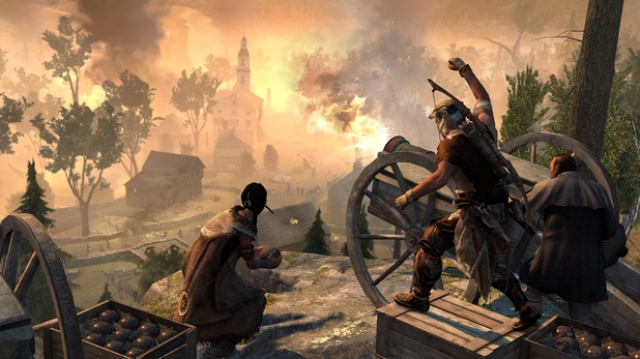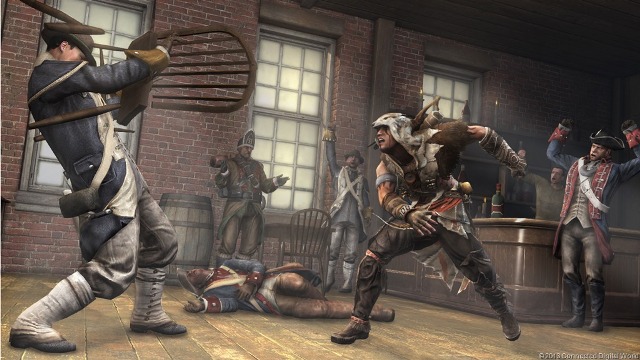Assassin’s Creed III: The Tyranny of King Washington Episode Two Review
 Game: Assassin’s Creed III: The Tyranny of King Washington – Episode Two: The Betrayal
Game: Assassin’s Creed III: The Tyranny of King Washington – Episode Two: The Betrayal
Developer: Ubisoft Montreal
Publisher: Ubisoft
Available On: Xbox 360, PlayStation 3, Windows PC, Wii U
Reviewed On: Xbox 360
The Betrayal is the ominously-titled second part of the Tyranny of King Washington trilogy and, whereas the first episode – The Infamy – very much set up the story and the events that were unfolding before us, this second instalment certainly looks to blow you away with pure action, action, action – and is a lot more combat-centric than the first episode.
The story picks up right where we left it at the end of the Infamy, and Connor awakes to find himself in the hub-bub of civilisation, in Boston town. Using what little information he managed to glean from his investigations in the first chapter of this DLC, he knows that he has to track down Benjamin Franklin, and that Franklin is crucial to being able to bring down the mad King Washington.

The pace of the game is very fast, and you never feel like you are hanging around waiting for anything to happen – there feels like a constant urge to be pushing on to the next story mission and to find out what you need to do next. This is good in terms of story-telling, but does make the episode seem rather short and you can probably breeze through the entirety of the story-based action in a matter of hours if the side quests don’t distract you. It must also be said that this episode is more violent and brutal than the last (and there is one slightly disturbing scene) due to the level of violence. Most gamers will be somewhat de-sensitised to this, but when you compare it to the actual violence you see in the regular Assassin’s Creed titles, it seems like a conscious choice by the developers to push the envelope further here, in order to illicit a stronger emotional response and to really hammer home the betrayal that the episode is named after.
What is a little irritating about the story is that the characters tend to suffer from a kind of selective amnesia at times – where players know what must be done, but the characters act none the wiser. For instance, Connor knows that Franklin is important and must be freed – but he tries to kill Franklin on the first opportunity he gets. Another silly little thing that just suggests that some of the story missions were rushed is when you need to find a disguise: rather than simply kill a guard and take his outfit, the player must knock him out and then carry the prone body back through the city streets to the hideout. Not a major flaw of course, but a little annoyance – especially as it seems so illogical to take the whole man rather than just his uniform. But that is gaming logic in a way, and in DLC the developers constantly have to try to fit new ideas into already-fixed gaming mechanics, so perhaps this was the most feasible way to pull off the scene.
When we find ourselves back in Boston, it is more or less unchanged from the main game, and by focusing on just one map for gameplay, the overall experience is a bit tighter – and this time the focus is certainly more on combat against groups of Bluecoats. Even when you are on a sneaking mission, remaining unseen throughout is difficult and the episode seems to have a more action-orientated feel overall.
Once again, we get the chance to re-connect with several familiar characters who featured prominently in the main Assassin’s Creed III story, with the writers taking the opportunity to switch up the expected loyalties and morals of some of the characters – especially as many NPC’s have been affected by the mind-controlling powers of the Apple of Eden that George Washington possesses.
Just as players gained control of a new animal power in the first episode, after drinking a hallucinogenic tea and going on a Spirit Journey we get to go on another in this outing – allowing players to have the powers of two animals. Of course, we already wield Wolf powers, and in the Betrayal we learn the way of the Eagle – teaching two new techniques.
The first is Eagle Flight, which can be used at any time to allow Connor to take on the form of an Eagle and secretly fly from one point to another nearby. This can take a little getting used to as you need to be able to spot which locations are or aren’t in range, and you can also learn to chain together flights to allow for very quick movement across the map.

Once you get used to it, it can be a very fluid system, but the ability to, in effect, fly away from any situation does make the game play like an entirely different title. You could more or less play the entire episode without having to climb any buildings. It’s fun in a way, but it doesn’t really feel like an Assassin’s Creed title anymore and this is perhaps one super-power too far, regardless of the “what if” premise of the DLC, which lends itself to over-the-top action. It all seems a little too much.
The other Eagle skill you learn is the Eagle Assassination – whereby when you are perched at a suitable height, you can hold down a certain button to target a nearby enemy. Release the button and Connor again turns into an Eagle and swoops down to dispatch his foe silently. In theory, matching together Eagle Flight and Eagle Assassination should make Connor the ultimate killing machine, but unfortunately the targeting reticule is a bit random and won’t always target who you intend it to, and sometimes the game won’t even bring up the target and let you use the power despite you being in a suitable location. It is irritating that the skill is a bit too picky in regard to when it will let you use it – which can certainly cause frustration when you are in the middle of a carefully-planned kill.
There are still plenty of side quests to pursue but none of these really quite manage to capture the imagination – especially as they all remain identical to those found in the first episode. There are missions feeding the poor, rescuing civilians from animal attacks and the like – but there is no variety and these are all a little boring as you have done it all before in episode one, albeit in the forest setting. There are still a couple of memory shards to collect which help with the backstory a little bit, but it is a shame that the developers couldn’t have thought up a few new side quests that perhaps suited the Boston setting a little better, rather than just re-hashing those seen in the last instalment.

VERDICT: Whilst The Betrayal does a few things right – with a focused narrative and lots of action to partake in – it all still feels a bit too samey when compared to the first chunk in this DLC trilogy. Despite the different setting and events, the title doesn’t do enough to make it feel original after the imaginative first episode. It is by no means a failure, and learning a new animal power in each episode is a fun idea too – but Connor is quickly becoming too super-powered, which eliminates any real challenge from proceedings. The story is still a fascinating idea and lends itself to lots of interesting situations and this remains its strongest feature. Let us just hope that Ubisoft has a grand finale planned, as – after a strong start – this add-on series has taken somewhat of a downturn.





